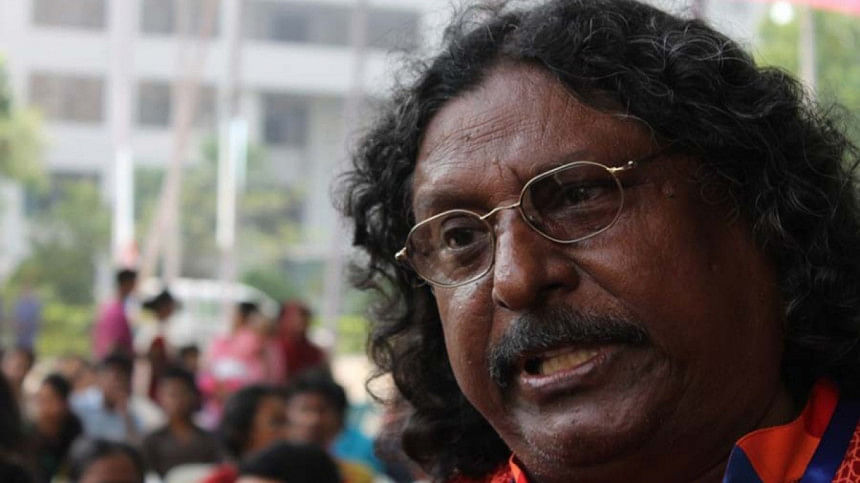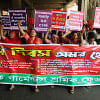Remembering Fakir Alamgir, the voice of the working class

In commemoration of International Labour Day today, we not only honour the struggles and triumphs of workers across the globe but also pay tribute to the cultural icons who have amplified their voices and championed their causes throughout their lives.

Amongst them, Fakir Alamgir stands out as a monumental figure in Bangladesh, known for his exemplary musical contribution to uplifting the rights, voices, and spirits of the working class in the country. Fakir Alamgir's life embodies the spirit of May Day — representing both its struggles and triumphs. His lifelong dedication to the rights and welfare of the working class through his music marks him as a true champion of the labourers' cause.

Fakir Alamgir, the folk music artiste, was a man of unwavering spirit and a powerful voice. He might have stood out amidst crowds but he echoed their sentiments from afar. Be it through songs, slogans, Bengali New Year celebrations, Language Martyrs' Day, Independence Day, or Victory Day events, his voice and songs have become indispensable. Notably, whenever a prominent figure passed away or on significant national observances, Fakir Alamgir was there, lending his voice. His contribution to the nation on such solemn occasions was unparalleled.
Born on February 21, 1950, a day observed nationally as Language Martyrs' Day, Fakir Alamgir's life was infused with the spirit of resistance and advocacy for his dear country from the very beginning. His music career, intertwined deeply with the fabric of Bangladeshi social and political life, served as a loudspeaker for the voiceless and a beacon of inspiration during times of turmoil.

Without him, who would have immortalised lyrics like, "Kaindyo Na Rohomater Maa" (Don't cry, Rohomat's mother), "Mayer Ek Dhar Dudhher Daam" (Who could ever repay the kindness bestowed by mothers?), "O Sokhina" (Dear, Sokhina), "Nelson Mandela", "Jon Henry", "Ahare Kallu Matabbar", "Kalo Kalo Manusher Deshe" (In a country of Black people), "Camelia Kam Koriya Kothai" (Dear Camelia, where do you go after work?) and many more classic anthems, representing the innermost emotions, hardships, and struggles of the working class so eloquently?

From his early days as a student at Dhaka University, where he pursued a degree in journalism, Fakir was drawn not only to music but also to cultural activism. His involvement in the Student Union, the 1969 Mass Uprising and the 1971 Liberation War underscored his commitment to societal change. His songs from these periods do not merely reflect the aspirations and struggles of his people; they inspired and mobilised them.
To express the agony accumulated from the experiences of war and to merge Western tunes with Deshi music, he, along with several artistes of his time, initiated the first wave of Bangla pop songs. However, it was his dedication to labour rights that set him apart.
Fakir's songs spoke directly to and of the labourers — addressing their hardships, celebrating their spirit, and most importantly, advocating for their rights. His voice became synonymous with the spirit of International Labour Day in Bangladesh, embodying the resilience and solidarity of the working class.

His most iconic song, "O Sokhina Gesos Ki Na Bhuilla Amare," (O Sokhina did you forget me) first broadcast on Bangladesh Television's "Anandamela'' programme in 1982, became an anthem beyond its immediate popularity. This song, like much of his work, carried the essence of folk tradition while speaking directly of contemporary issues troubling the common man, especially the labourers.
Throughout the eventual unfolding of his life, Fakir Alamgir not only remained a musician but also became a prolific writer and a cultural organiser. He authored several books focusing on the Liberation War, folk music, and personal narratives that showcased his deep understanding of Bangladesh's cultural and historical ethos. His involvement in founding the cultural organisation Wrishiz Shilpi Gosthi and leading the Bangladesh Gan Sangskriti Parishad further exemplified his commitment to cultural activism.
His contributions have also been widely recognised with numerous accolades, including the prestigious Ekushey Padak, and Sher-e-Bangla Padak amongst many others. These honours were a testament to his profound impact not just on music but on the cultural and social landscape of Bangladesh.

Fakir's music continues to inspire new generations of activists and artistes in Bangladesh and beyond, ensuring that the plight of the labourers remains at the forefront of our collective consciousness.
In remembering Fakir Alamgir on this International Labour Day, we not only celebrate his life and art but also reaffirm our commitment to the causes he championed. His was a voice that never shied away from truth. A voice that, through the beauty of music, fought tirelessly for the rights of every Bangladeshi working class and the underprivileged.
Today and forever his songs continue to echo across the fields and factories of Bangladesh as a lasting reminder of his contribution to the labour movement and his enduring legacy in the hearts of his people.

 For all latest news, follow The Daily Star's Google News channel.
For all latest news, follow The Daily Star's Google News channel. 











Comments